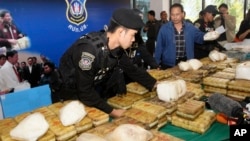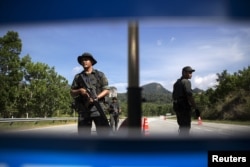The United Nations says Southeast Asia’s economic success has been marked by an expansion of organized crime and terrorism challenges, especially in areas of weak governance and limited capacities.
The U.N.’s Office on Drugs and Crime (UNODC) said the economic gains have led to major upgrades in air, road, rail and port infrastructure, as well as an easing of cross-border controls.
It added that while new economic and development opportunities have occurred, it has also led to “differences and disparities between countries’ abilities to address transnational organized crime and related security challenges.”
UNODC Deputy Executive Director Aldo Lale Demoz, speaking at a regional security conference, said the signs are there of common security challenges from transnational crime.
“The increasing connection to Southeast Asia with the rest of Asia and the global community is indeed impressive. But whilst increased connectivity hold many clear benefits for trade and economic growth, here in Asia we see clear evidence of growing security challenges including those posed by transnational crime and terrorist groups,” he said.
Southeast Asia has reported strong economic gains and trade development. The Association of Southeast Asian Nations (ASEAN) reported the region’s combined economic output (GDP) at $2.55 trillion in 2016, with merchandise trade at $1.06 trillion in the first half of 2016, of which 24 percent was intra-ASEAN.
“A significant threat’
Somchai Seanglai, an advisor to the Thai justice minister, said the pace of ASEAN’s development, integration and regional security challenges highlighted the need for increased cross-border solutions.
“Transnational crime poses a significant threat to sustainable economic development with detrimental effect, including of corruption, and the distortion of the open market, it also poses a threat to national security and security operations,” Somchai said.
Somchai added the expanded trade has led to risks of an increase in crimes, including human trafficking, money, drug and precursor chemical trading, counterfeit goods, wildlife and forest products, as well as terrorists “able to move across borders more easily.”
UNODC’s Lale Demoz said the massive amounts involved in transnational crime pose a threat to regional sovereign states.
“Transnational organized crime, especially money flows in the region, are conservatively estimated to exceed a rather large amount of nearly $100 billion per year, accumulating each year.”
“This enormous sum is nearly double the legitimate GDP of countries such as Myanmar and many times the GDPs of other countries in the region. This is a very powerful force acting without respect as regards sovereign borders states or people,” he said.
Terrorism concerns
U.N. officials said the added concern lies with fears of terrorist attacks by members linked to the so-called Islamic State (IS). U.N. officials assert that conservative estimates say at least 1,000 people from the region have traveled to the Middle East as foreign fighters, some of whom of are now returning.
ASEAN leaders recently meeting in Manila committed to “addressing transnational and transboundary challenges and threats that have the potential to undermine the stability and well-being of ASEAN member states and the region."
Jeremy Douglas, Asia Pacific UNODC regional representative, said the ASEAN meeting highlighted the need to address solutions to boost regional security.
“The leadership of the region agreed to start to prioritize securing borders of this region to counter transnational organized crime and terrorist threats, which appear to be expanding and growing in certain parts of the region,” Douglas said. “These types of crimes are for drug trafficking, human trafficking, wildlife and forest crime as well as terrorists’ movement across multiple borders.”
He said Thailand, a major transit destination for drug trafficking, has been taking steps to put in place mechanisms at land borders to combat transnational crime flows.
Common strategy needed
Across the region, port control units have been established in eight countries to monitor and secure shipping trade and reduce the risks of trafficking through key ports.
Douglas said a common regional strategy is needed to address the issues.
“The region needs to have in place across the region a common way to secure the region. At present there are different levels allowing international crime groups to take advantage of these differences,” he said.
Officials are calling on regional law enforcement, justice and agencies to work closer to deal with the economic threats posed by transnational cross border crimes.
The UNODC said border management has been identified as one of the nine key issues needed to be addressed under the ASEAN Political-Security Community.











